An Excursion into "The Last Flight"
by Michael Martin DeSapio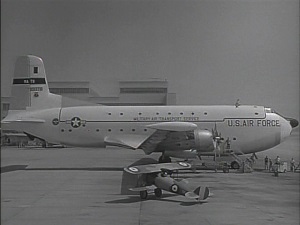
"Witness Flight Lieutenant William Terrance Decker, Royal Flying Corps, returning from a patrol somewhere over France. The year is 1917. The problem is that the Lieutenant is hopelessly lost. Lieutenant Decker will soon discover that a man can be lost not only in terms of maps and miles, but also in time - and time in this case can be measured in eternities."
"Flight" was Richard Matheson's original, telegraphic title for this engrossing time travel episode of The Twilight Zone, his first contribution to the series; the title was later expanded to "The Last Flight." The word "flight" has a double meaning here, referring both to aviation and to a "flight" from duty. The plot is, roughly, as follows: In 1917, a British World War I fighter pilot passes through a mysterious cloud and lands in a modern U.S. air base in 1959. Seized by fear and panic, he had abandoned a comrade to German aircraft. Now propelled into the future, he learns that the comrade survived and went on to become a hero in World War II, saving hundreds of lives. The pilot, thanks to the machinations of the Twilight Zone, is given a chance to go back to 1917 and save the comrade, sacrificing his own life in the process. Thus the flight in question is literally the last flight of his life as well as his last "flight" from responsibility—the point at which he overcomes his fear and cowardice.
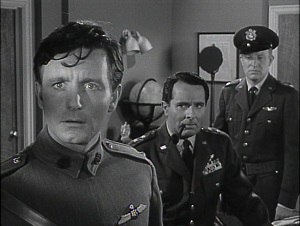 "The Last Flight" is a chamber piece with just four principal characters: the Royal Flying Corps pilot, Lt. William Terrance "Terry" Decker; the two military officials who detain Decker on the air base, Major General George Harper and Major Wilson; and Decker's comrade, Air Vice Marshal Alexander Mackaye (who plays a brief but pivotal role at the end). All four roles are well filled, and the acting is of a high caliber, particularly from British actor Kenneth Haigh in the role of Decker. The episode makes effective use of just three settings: the exterior of the Lafayette Air Base in Reims, France (filmed at the Norton Air Force Base in San Bernardino, California); Harper's office, and a detention cell. "The Last Flight"was first broadcast on February 5, 1960 at the exact midpoint of the first season, the eighteenth of 36 episodes. While generally well respected, the episode is rarely discussed - a pity, since it is one of the Zone's most remarkable time travel entries.
"The Last Flight" is a chamber piece with just four principal characters: the Royal Flying Corps pilot, Lt. William Terrance "Terry" Decker; the two military officials who detain Decker on the air base, Major General George Harper and Major Wilson; and Decker's comrade, Air Vice Marshal Alexander Mackaye (who plays a brief but pivotal role at the end). All four roles are well filled, and the acting is of a high caliber, particularly from British actor Kenneth Haigh in the role of Decker. The episode makes effective use of just three settings: the exterior of the Lafayette Air Base in Reims, France (filmed at the Norton Air Force Base in San Bernardino, California); Harper's office, and a detention cell. "The Last Flight"was first broadcast on February 5, 1960 at the exact midpoint of the first season, the eighteenth of 36 episodes. While generally well respected, the episode is rarely discussed - a pity, since it is one of the Zone's most remarkable time travel entries.
A compelling script
Matheson's script is tightly structured and dramatically compelling, although its appeal is closer to that of a cerebral closed-room drama like 12 Angry Men than to a more action-oriented piece. Scenes of intense argument between the three principals are balanced against reflective monologues for Decker in which he reveals his feelings and his failings. The episode's first act consists of Decker's landing on the air base and being detained by Wilson and Harper. Led progressively further into a vortex of bewilderment, Decker discovers that he has somehow ended up forty-two years in the future: it is no longer March 5, 1917 but March 5, 1959 (in choosing this date, Matheson may have been counting on the proximity to the Ides of March, with its fateful associations). The plot thickens as we learn that Decker knew Alexander MacKaye, the veteran military official who is coming to the base that very day to conduct an inspection. The first act concludes with a cliff-hanger: Decker declaring that Mackaye can't possibly be coming that day...because he's dead.
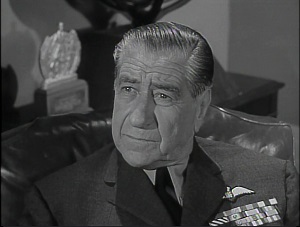 The second act features a pressure-cooker scene between Decker and Wilson in a detention cell, in which the two men try to unravel the inexplicable. Where did Decker come from? Why does he believe Mackaye to be dead? Once it has been explained to him that Mackaye is alive, why is he afraid to meet him? The confined space mirrors their mental confinement; repeatedly they come up against a wall, both literally and psychologically. The window functions as a symbol of freedom and release - a freedom and release which Decker will find only by flying back into the clouds to his ennobling death.
The second act features a pressure-cooker scene between Decker and Wilson in a detention cell, in which the two men try to unravel the inexplicable. Where did Decker come from? Why does he believe Mackaye to be dead? Once it has been explained to him that Mackaye is alive, why is he afraid to meet him? The confined space mirrors their mental confinement; repeatedly they come up against a wall, both literally and psychologically. The window functions as a symbol of freedom and release - a freedom and release which Decker will find only by flying back into the clouds to his ennobling death.
In a moving monologue, Decker confesses that he fled the Germans' attack and left Mackaye (or "old Leadbottom" as he was known to the comrades) to die. Wilson, however, explains that Mackaye survived and became a hero in the Blitz ("That was the second war we told you about.") Wilson says this line with slight embarrassment, as if concerned that Decker will think his own war efforts in vain in light of the dismaying future course of history. An anxious closeup of Decker shows that everything is finally sinking in. There will be more war, and more lives at stake. It dawns on him that perhaps he was "put here for a reason" and that if Mackaye was indeed helped by someone on that fateful day, it must have been him. He must therefore return back to 1917 and save Mackaye. Decker overcomes Wilson and the guard ("decks" them, in fact), breaks out of the room, and runs to his plane. He is already in the cockpit when Wilson orders him at gunpoint to stop. Decker refuses to back down: "Well, fire! I'd rather die." Wilson, disarmed by this show of courage, lets Decker go. As Decker's plane takes off, the wind blows Wilson's cap off, a perfect metaphor for his bewilderment and professional embarrassment.
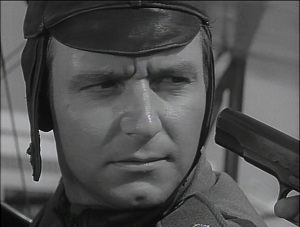 The concluding scene opens with Harper rebuking Wilson for letting Decker get away. Mackaye arrives; "I trust you had a comfortable flight" is Harper's telling greeting. Harper and Wilson ask him about Decker in an attempt to get to the bottom of what happened in 1917. Mackaye tells of how Decker at first disappeared into a cloud as if fleeing, but then suddenly dove back and fired at the German planes, saving MacKaye but getting himself killed. As Mackaye corroborates Decker's story we sense Wilson's increasing professional vindication and Harper's corresponding befuddlement. Harper produces Decker's identification card, to Mackaye's amazement. ("Where in heaven's name did you get these?" he asks, then, "What the devil is this all about?!") Wilson replies gravely that "you'd better sit down, old Leadbottom." Mackaye is aghast; Harper turns towards the window, his uneasy expression a mixture of mortification at his subordinate's faux pas and suspicion that something supernatural has indeed taken place. The camera moves out of the office window towards the heavens where Decker disappeared forever. Rod Serling's closing narration, evoking a familiar line from Hamlet, drives home the point that "there are more things in heaven and earth than are dreamt of" in the mind of a strict rationalist like Harper.
The concluding scene opens with Harper rebuking Wilson for letting Decker get away. Mackaye arrives; "I trust you had a comfortable flight" is Harper's telling greeting. Harper and Wilson ask him about Decker in an attempt to get to the bottom of what happened in 1917. Mackaye tells of how Decker at first disappeared into a cloud as if fleeing, but then suddenly dove back and fired at the German planes, saving MacKaye but getting himself killed. As Mackaye corroborates Decker's story we sense Wilson's increasing professional vindication and Harper's corresponding befuddlement. Harper produces Decker's identification card, to Mackaye's amazement. ("Where in heaven's name did you get these?" he asks, then, "What the devil is this all about?!") Wilson replies gravely that "you'd better sit down, old Leadbottom." Mackaye is aghast; Harper turns towards the window, his uneasy expression a mixture of mortification at his subordinate's faux pas and suspicion that something supernatural has indeed taken place. The camera moves out of the office window towards the heavens where Decker disappeared forever. Rod Serling's closing narration, evoking a familiar line from Hamlet, drives home the point that "there are more things in heaven and earth than are dreamt of" in the mind of a strict rationalist like Harper.
Decker's two antagonists are well contrasted. Harper is a cynical skeptic, unable to believe in the supernatural; he is convinced Decker is a hoaxter or lunatic with plans to assassinate Mackaye. Wilson is a more sympathetic character who tries to understand Decker and listens to his confessions with an open mind. In his heart he wants to believe Decker's story, as fantastic as it may be. During the detention room scene he reassures Decker, "It's not a crime to be afraid."
Indeed, the nature of courage is the major moral theme of "The Last Flight." In his great monologue, the heart of the episode, Decker exclaims, "I'm a coward. Always been a coward. All my life I've been running away pretending to be something I never was, never could be." Decker unmasks the macho pose adopted by him and his fellow fighters as "self delusion" and "the brand we all put on." Decker comes to realize, however, that courage does not consist simply in being an "ice cold killer in the sky" and that moral deliberation and reflection can lead one to greater insight and hence to heroic action. Existentialist themes abound in The Twilight Zone, and Decker could be described as an existentialist hero: someone who confronts the meaninglessness of his situation and rises above it, conferring his own meaning upon it by acting in accord with an internal morality.
Terry Decker, everyman
Matheson exploits Decker's culture shock in an entertaining manner. One of the episode's memorable images is of Decker's little biplane landing next to an enormous American jet craft; emerging from his plane, Decker exclaims to Wilson,"But all this! We had no idea you were so advanced!" The incongruity of the image of the two planes suggests Decker's underdog status in this tale. (Later, during his escape scene, we watch as he performs the laborious task of manually starting the motor by spinning the propellers, adding greatly to the suspense.) As he is led by Wilson into the military compound for questioning, Decker does a double take at the sight of a female officer (women in the military being unheard of in Decker's day). Only one other woman appears in the episode, a brunette officer whom Decker passes during his escape from the compound. This time, the tables are turned and it is the woman who stares behind her at the sight of this intriguing young man in the antiquated costume. In the interrogation scene, Decker's puzzlement at Harper's use of the words "air show", "film" lends some humor to the proceedings: Decker's quaint old-fashioned uniform led Harper to believe that he was making a movie.
As embodied by the 28-year-old British actor Kenneth Haigh, Decker is an everyman with whom we can easily identify, his doughy-faced, ordinary outward appearance masking a dashing Byronic hero. Haigh was a stage actor closely associated with the "angry young man" school of British drama in the 1950s, a movement aimed at anti-establishment social criticism. Haigh's performance as Decker belongs on any reasonably complete list of great TZ male lead performances. His speech and manners feel just right for an Edwardian Englishman, and his stiff-upper-lip attitude and touches of dry humor lend the character color. The roles of Harper, Wilson and Mackaye are ably filled by character actors Alexander Scourby (a frequent movie heavy and voice actor best known for his resonant recordings of the Bible), Simon Scott (who would go on to do another production about flight in the 1975 film "The Hindenburg," where he also played a government officer), and the 81-year-old Robert Warwick (a veteran supporting player who was prolific in the 1930s and '40s).
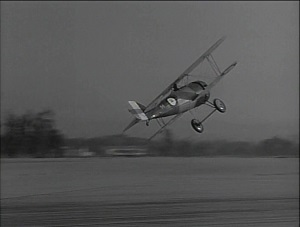 Time travel
Time travel
"The Last Flight" offers a most original and inventive treatment of time travel. In the TZ episode "Back There", the protagonist goes back in time to alter a historical event (Lincoln's assassination) so that the present is in turn altered. By contrast, in "The Last Flight", Decker travels forward in time, then goes back to the past so that the future can remain as it should be. While Decker undergoes his journey of discovery in 1959, the moment he left in 1917 is, as it were, halted or suspended. (This scenario is very similar to that of "A Hundred Yards Over the Rim.")
We might wonder, what would have happened if Decker hadn't gone back to 1917? Would Mackaye have failed to show up at the air base? And what about all the people he saved in the Blitz? There is a paradox here that ultimately defies logical analysis. Perhaps the point of the time travel is the moral significance it has for Decker, rather than actually changing the outcome of history.
The model for Terry Decker
"The same sort of thing happened to Guynemer," declares Decker as he gazes out of the window of Harper's office; "At his memorial service the Cardinal said, "He belonged to the sky, and the sky has taken him." Georges Guynemer (1894-1917) was a French fighter pilot who went missing in action on September 11, 1917 while on a combat mission with a comrade. His flying prowess combined with his mysterious death caused him to become a national hero in France. It is likely that "The Last Flight" was directly inspired by Guynemer's story. (We might note in passing that Guynemer died after the date the episode takes place, one of a number of historical liberties taken in the episode.) With his sensitivity and his skepticism about war Decker also recalls Wilfred Owen, the famous British poet of World War I who perished in the war at the age of twenty-five. Decker, indeed, stands as a symbol of the "Lost Generation" that fought the Great War, perhaps the most traumatic event of the twentieth century.
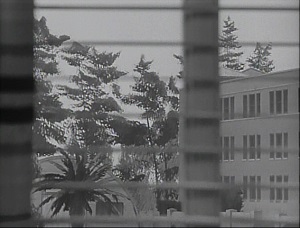 Poetry and history
Poetry and historyThe "white cloud" which envelops Decker functions as the time travel mechanism, his portal into the Twilight Zone. In the Bible, clouds are a symbol of the presence of God and frequently accompany theophanies and the miraculous. We may even choose to see a Christ allegory in the story of Decker: a man who "came down from heaven," was disbelieved except for one man who staked his faith in him, and finally sacrificed his life after being "put on trial" for who he claimed to be. The sky is of course a symbol of heaven and glorification. Apart from its inherent poetry, the aviation theme also brings us back to the origins of The Twilight Zone: we recall that Rod Serling was a paratrooper in World War II and that the phrase "Twilight Zone" was taken from aviation jargon, referring to the moment at which a pilot can no longer see the horizon.
The music in "The Last Flight" was recycled from Bernard Herrmann's score for another episode about an Air Force pilot, "Where is Everybody", and it functions equally well in both episodes. At times we hear propulsive music suggestive of airplane motors, at others grave sonorities suggestive of the weight of civil authority, while the more eerie moments (Decker's monologue about Guynemer, for example) are underscored by vaporous string harmonies which enhance the feeling of mystery.
"The Last Flight" captures the flavor of a particular moment in history. When the episode was first broadcast World War II was still fresh in the minds of many viewers, World War I remained within living memory, and the Cold War raged on. The tale of Lt. Decker brings these three conflicts together, causing them to overlap in an imaginative and very adult fantasy. Thus like The Twilight Zone as a whole, "The Last Flight" is about the twentieth century. One could almost imagine it being shown in history class. Intelligent thought-provoking entertainment, it continues to tease the mind and uplift the heart.
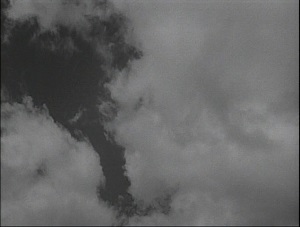 "Dialog from a play, Hamlet to Horatio: There are more things in heaven and earth than are dreamt of in your philosophy. Dialog from a play written long before men took to the sky: There are more things in heaven and earth and in the sky than perhaps can be dreamt of. And somewhere in between heaven, the sky, and the earth, lies The Twilight Zone."
"Dialog from a play, Hamlet to Horatio: There are more things in heaven and earth than are dreamt of in your philosophy. Dialog from a play written long before men took to the sky: There are more things in heaven and earth and in the sky than perhaps can be dreamt of. And somewhere in between heaven, the sky, and the earth, lies The Twilight Zone."
To contact Michael, send email to michaelmartind@gmail.com
